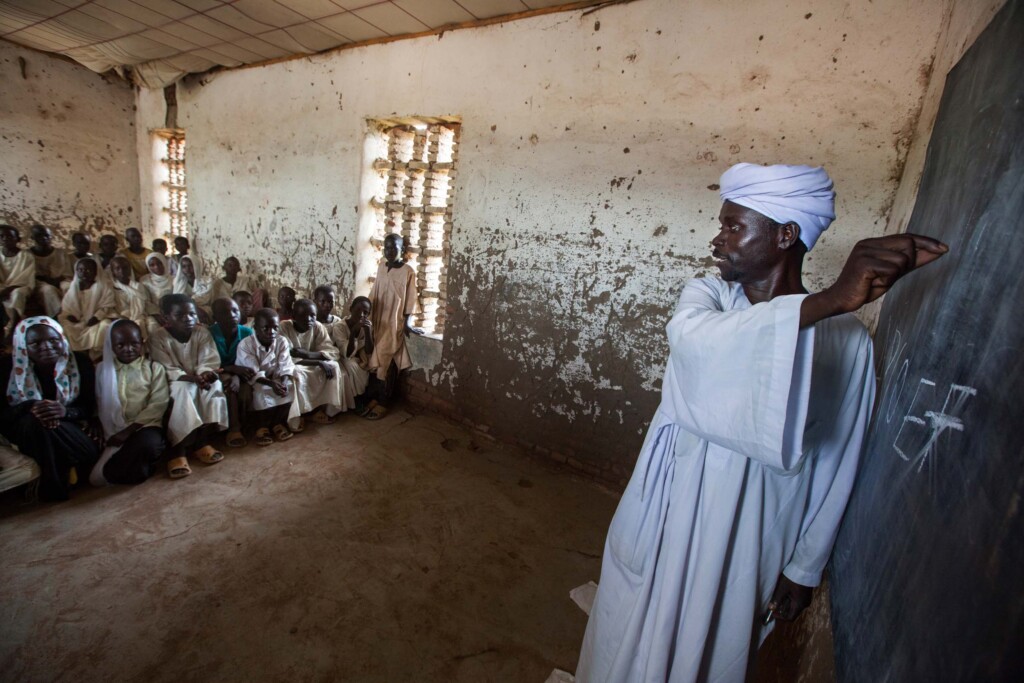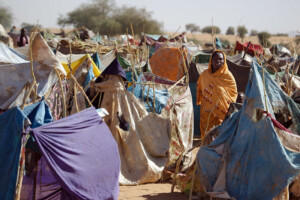Sudanese teachers already discussing ‘next steps’ after strike, university protests continue

A primaty school teacher with a class in Darfur (File Photo: Albert González Farran / UNAMID)
KHARTOUM – January 17, 2023
Teachers in Khartoum are already discussing “the next steps” to take after the end date of their three-week-long strike action as they are not expecting any positive responses from the authorities.
The three-week-long strike by schoolteachers in Sudan was originally set to end on January 29.
Duriya Babiker, leading member of the Sudanese Teachers’ Committee (STC), told Radio Dabanga that “almost all teachers working at government schools in Khartoum state organised extensive meetings in preparation for the next steps after the end of the current strike on January 29”.
She said that, at the moment, members are leaning towards “continuing the closure of the schools and escalating the protests by staging sit-ins, for instance, in light of the authorities’ neglect of resolving teachers’ problems”.
The STC requested teachers at all government schools in the country to come up with a unified vision on forms of escalation.
Babiker said that “patriotic parties have offered to mediate but the teachers want the authorities to acknowledge and fulfil their demands”.
Last week, an STC member already said that the strikes are likely to continue until all their demands are met after what was called a ‘disappointing’ meeting with the Minister of Finance the week before, who not only refused to meet their demands but also abandoned previous promises.
The STC also reacted with scepsis to a proposal by the Ministry of Education to install a mid-year holiday.
“The timing of the suspension of studies for three weeks coincides with the strike announced by the Teachers’ Strike Committee,” she told Radio Dabanga.
Babiker then also shared her frustration over the Khartoum state Education Ministry’s plan of collecting SDG800 (US$1.40) as exam fees for each student from all schools, even private ones, and explained that they “had no right to collect money from students” because “education is officially free”.
University protests
On Sunday, the University Lecturers Committee staged protest vigils in front of the gates of a number of universities in conjunction with their strike, which entered its second week, to demand the implementation of the new 2023 salary structure.
Lecturers at El Zaeem El Azhari University and El Gezira University refuse to participate in the strike.
Also on Sunday, the Coordinating Committee for Students of Engineering at the University of Sudan organised a protest march to the university to reject the increase in registration fees.
The students chanted slogans denouncing the high costs of living and the economic pressures on their families.
A large number of students will be denied study because of the exorbitant fees, one of the students told Radio Dabanga. At least 96 per cent of the students did not register yet due to the large increases.
“The administration of the University of Sudan, which now announced the resumption of studies, is only interested in collecting fees and not a desire to start the studies,” the student explained.
More and more Sudanese families tend to send their sons and daughters to Egypt to study there, while some families temporarily even moved to Egypt, because of the lower costs.
University registration fees at an Egyptian public university do not exceed $600 per academic year, which is equivalent to roughly SDG345,000, while the fees in Sudan currently range can be as high as SDG2 million.
Housing, transportation, and livelihood costs for a student in Egypt do not exceed $100 per month (roughly SDG 58,000), which is again much lower than the monthly expenses of students in Khartoum.











 and then
and then